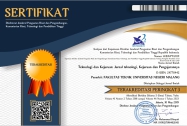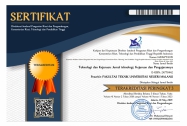Problem Based Learning: Suatu Upaya Meningkatkan Prestasi Belajar Las SMAW Siswa SMK
Abstract
Optimization of SMAW learning is necessary for vocational school students to achieve optimal competence. Problem-Based Learning (PBL) was reported in increasing skill learning outcomes. However, a specific PBL treatment in SMAW subjects has not yet published. This research contributed to how to give the SMAW learning method through the PBL model. This research adopted the conventional model as a control of the PBL experiment model. This research applied quasi-experiment with a population of the X-th grade of the VHS students. The samples were X-Mechanical and X-Automotive class, respectively. To amplify the success of the PBL model, the research visually analyzed the students' weldment results based on the surface quality appearance. PBL model increased the study outcome capabilities of the SMAW method up to 17.5 percent (from 75.9 percent to 93.4 percent). This increment was 30.6 percent higher than the conventional method. Statistical evident showed that the PBL index gain on the t-test (a equals 5 percent) was better and followed by a better physical fact in weld surface quality at the weldment area than the conventional one
Keywords
Full Text:
PDFReferences
Alam, M. B. (2010). The influence of surface geometry and topography on the fatigue cracking behaviour of laser hybrid welded eccentric fillet joints. Applied Surface Science 256, 1936- 1945. Farisi, A. H. (2017). Pengaruh Model Pembelajaran Problem Based Learning Terhadap Kemampuan Berpikir Kritis Dalam Meningkatkan Hasil Belajar Siswa pada Konsep Suhu dan Kalor. Jurnal Ilmiah Mahasiswa (JIM) Pendidikan Fisika., 2(3), 283-287. Frostevarg, J. K. (2014). Undercuts in Laser Arc Hybrid Welding. 8th International Conference on Photonic Technologies LANE 2014, Physics Procedia, 56 (pp. 663-672). Sweeden: Elsevier B.V. H.J.Yewa, E. G. (2016). Problem-Based Learning: An Overview of its Process and Impact on Learning. Health Professions Education 2, 75–79. Indonesia, P. (3 de 11 de 2017). Sinergitas BUMN Menyiapkan Tenaga Kerja Welder Membangun Negeri. Acesso em 12 de 9 de 2018, disponível em PAL Indonesia : https://www.pal.co.id/publikasi/news/858 Loyens, S. J. (2015). Problem-based learning as a facilitator of conceptual change. Learn Instr Vol.38,, 34–42. Mendez, P. E. (2003). Penetration and defect formation in high current arc welding. Welding Journal 82, 296-306. Oja, K. (2011). Using problem-based learning in the clinical setting to improve nursing students' critical thinking: an evidence review. J Nurs Educ 50(3), 145–151. Pease, M. K. (2011). Experiment alanalys is of the effective components of problem-based learning. Sci Educ 95(1), 57 - 86. Reza Adi Giyantono, I. (2013). Penerapan Model Pembelajaran Problem Base Learning Pada Mata Diklat Las Kelas X TPM SMK Taman Siswa Surabaya. Jurnal Pendidikan Teknik Mesin Vol. 02 No. 01 , , 96 - 102. Shin I-S, K. J.-H. (2013). The effect of problem-based learning in nursing education: a meta-analysis. Adv Health Sci Educ 18 (5), 1103–1120. Siti Rahayu, A. H. (2017). Penerapan Model Pembelajaran Problem Based Learning (PBL) Terhadap Kemampuan Berpikir Kritis Siswa Kelas X IPA SMAN 1 Sukawangi Pada Materi Pencemaran Lingkungan. Jurnal Skripsi Pendidikan Biologi, 1-9.
Strobel J, v. B. (2009). When is PBL more effective? A meta-synthesis of meta-analyses comparing PBL to conventional classroom. Interdiscip J Problem-based Learn 3(1), 1-9. University, S. (12 de 9 de 2018). Problem-Based-Learning. Acesso em 12 de 9 de 2018, disponível em Teaching Commons.: https://teachingcommons.stanford.edu/
DOI: http://dx.doi.org/10.17977/um031v43i12020p28-34
Refbacks
- There are currently no refbacks.
Copyright (c) 2020 Teknologi dan Kejuruan: Jurnal Teknologi, Kejuruan, dan Pengajarannya
Teknologi dan Kejuruan: Jurnal Teknologi, Kejuruan, dan Pengajarannya
E-ISSN 2477-0442 (online)
Contact
Faculty of Engineering, Universitas Negeri Malang (UM)
Jl. Semarang No 5 Malang 65145, Building H5, 1st Floor.
Homepage: http://journal2.um.ac.id/index.php/teknologi-kejuruan
Email: teknologikejuruan.ft@um.ac.id

This work is licensed under a Creative Commons Attribution 4.0 International License.



2.png)
1.png)
1.png)
1.png)
4.png)
1.png)
.png)

3.png)
1.png)
1.png)


